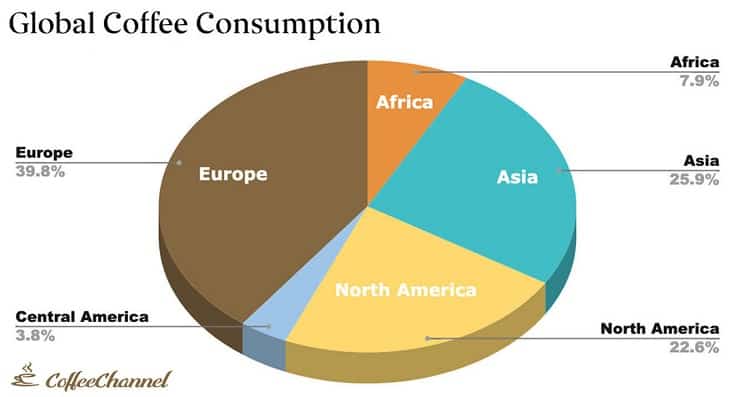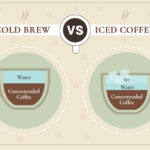
Note: This article’s statistics come from third-party sources and do not represent the opinions of this website.
Coffee is one of the most popular drinks on the planet, so the statistics surrounding this caffeinated commodity are genuinely astounding. It’s the beverage that keeps the world running and business and energy flowing, and it’s a staple of nearly half the world’s diet!
We’re taking a look at some exciting and awe-inspiring facts and figures regarding coffee consumption, production, and trade in the United States and worldwide. These will help put into perspective just how important and influential coffee has become throughout the world, and it may just give you a new appreciation for one of your favorite morning drinks.
So, grab a cup of coffee or espresso, and we’ll look at what an enormous impact coffee has on our lives.
Top 16 Coffee Consumption Statistics and Facts
- The average U.S. coffee drinker consumes between two and three cups of coffee each day (Statista)
- Last year alone, Americans consumed an estimated 3.3 billion pounds of coffee (Statista)
- The U.S. ranks 25th in the list of countries that drink the most coffee per capita (World Atlas)
- Surprisingly, 42.9% of Americans report that they drink coffee, not for the energy boost, but because they like the taste (Statista)
- Just under half of all U.S. coffee drinkers who buy coffee from a retail establishment do so via drive-through (National Coffee Association)
- Roughly 45% of all coffee drinkers in America who make their own coffee do so with a drip coffee machine (Statista)
- Drip coffee machines have become significantly less prevalent over the past five years, and single-cup machines are used 50% more than they were in 2015 (National Coffee Association)
- Regular coffee is consumed nearly twice as often as espresso or espresso-based drinks in America (Statista)
- Folgers, the leading coffee provider in America, sold over $1 billion worth of coffee in 2019 alone (Statista)
- Colombia is the most popular origin of coffee among Americans and provided over $1 billion of coffee beans to the country as a whole in 2018 (Statista)
- Decaffeinated coffee is the least popular coffee choice among Americans (Statista)
- Cappuccinos are the most common espresso-based drink among Americans, accounting for 33% of all espresso drinks in America in 2019 (National Coffee Association)
- 40% of Americans add milk or creamers to their coffee, while only 4% use milk alternatives like dairy-free creamer (National Coffee Association)
- Gourmet or specialty coffee has risen in popularity recently, rising about 25% in the past four years (National Coffee Association)
- A staggering 70% of all coffee consumed by millennials is in the form of gourmet, espresso-based beverages (National Coffee Association)
- In 2023, the coffee industry is projected to bring in just under $100 billion in revenue (Statista)

Top 8 Coffee Shop and Coffee Industry Statistics
- There are over 37,000 coffee shops and cafes in America as of 2020 (World Coffee Portal)
- Starbucks is the most popular coffee shop chain in America and leads significantly in popularity over Dunkin Donuts (World Coffee Portal)
- Starbucks has 14,875 locations throughout the United States, a staggering average of 297.5 stores per state (World Coffee Portal)
- Dunkin Donuts has 9,570 locations throughout the United States, a slightly less impressive average of 191.4 retail stores per state (Statista)
- Starbucks alone in 2019 brought in $26.51 billion in revenue (Statista)
- The average price of a single cup of coffee at the two most popular coffee chains, Starbucks and Dunkin Donuts, is $1.89 and $1.59 respectively (World Coffee Portal)
- The coffee shop industry in the United States as a whole in 2019 had a market size of $47.5 billion (Statista)
- New York City is the leading city for the number of coffee shops per capita, with San Francisco and Las Vegas close behind (WalletHub)
Top 8 Single-Serve Coffee Statistics
- Drip coffee maker usage has declined by 24% since 2015 (National Coffee Association)
- Single-serve coffee maker usage has increased by 50% since 2015 (National Coffee Association)
- About half of all American households with a combined income over $50,000 own a single-serve coffee machine (Statista)
- Single-serve coffee makers were the second most prevalent method of at-home coffee preparation for Americans in 2019 (Statista)
- Single-cup coffee servings account for about 36.5% of retail coffee purchases in the United States (Statista)
- About 40% of people in the United States report that there is a single-serve coffee maker at their place of employment (Statista)
- Starbucks accounts for 17.1% of the single-serve coffee market in the United States. Behind them is Keurig Green Mountain, accounting for 11.7% of the market (Statista)
- Single-serve coffee yielded $3.88 billion in sales in 2017 (Statista)

Top 5 International Coffee Consumption and Sales Statistics
- Worldwide coffee sales decreased in 2020 by about 3.8% as compared to 2019 (International Coffee Organization)
- Europe was responsible for about a third of all coffee consumption worldwide in 2019 (International Coffee Organization)
- Brazil accounted for about 44% of all exported coffee worldwide in 2019. Indonesia followed with roughly 8% (International Coffee Organization)
- More than 50 countries worldwide produce coffee in some capacity (National Coffee Association)
- Coffee price per pound in 2019 was the lowest the world had seen in over a decade (National Coffee Association)
Final Thoughts
It’s pretty clear that coffee is an incredibly important beverage, not only because it gets us through hectic mornings and busy days, but because it keeps the world running smoothly. Coffee accounts for a substantial portion of international trade, and although sales may have decreased in 2020, it’s likely to remain an essential commodity in our lives.
See Also:
- Coffee’s Surprising Health Benefits
- Inspirational & Funny Coffee Quotes to Start Your Day
- Which Country Drinks the Most Coffee?
- When did coffee come to America?
Featured Image Credit: Chris Benson, Unsplash















